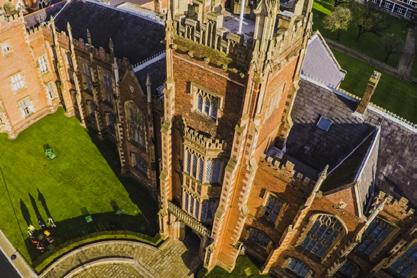
4 minute read
News: Personal ‘maps’ of life after prison in Cork city created: Queen’s degree is worth £100k to a graduate; TCD research shows complex reasons for rise in caesarean births
THREE men who experienced prison life, have created ‘life after prison maps' of Cork that reveal a personal picture of homelessness in the city.
Advertisement
The maps are part of a University College Cork (UCC) research entitled Clean Slate Cork that engages men with past criminal convictions as peer-to-peer researchers to document and analyse their challenges of navigating social reintegration with a criminal record. The project works in partnership with Cork Alliance Centre, a voluntary sector organisation based in Cork City who support people to make a fresh start after prison.
Three peer researchers with criminal justice experience, Paul O’Rourke, Tony Kenny and Keith Purcell, conducted research interviews with other men about their experiences of life after prison, focusing also on the challenges and opportunities of accessing education and employment after prison.
Biographical walking maps
They created biographical walking maps on the topic of ‘life after prison’ in Cork City. The maps were designed in collaboration with UCC Geography cartographer Mike Murphy and the titles of the biographical walking maps included: ‘homelessness after prison’; ‘finding your way in life’ and ‘places of safety. 11 stops across a map of Cork city chart a walk of hopelessness and happiness and provide a very personal experience of homelessness. “I found going to the hostel after prison soul destroying” states Stop 1 at St Vincent’s Hostel in Cork city “Sending a person there with addiction issues after prison, it’s like setting them up to fail.” Across the city the map charts the experience of life after prison and homelessness in Cork. The care of charity services is contrasted with the bleak experiences of both women and men on the streets of the city.
The peer researchers’ motivation to participate in the project was in their own words to ‘..use this experience to raise awareness that people with difficult pasts can create great futures’ and to ‘…raise awareness for men and women coming out of prison in future to not be put into homeless accommodation, but rather into safe places where they can prosper in a healthy environment’.
Professor Chris Williams, Head of the College of Arts, Celtic Studies and Social Sciences at UCC said: ‘I congratulate the CLEAN SLATE team on their well-deserved award. The research team has developed an innovative and impactful project that is communicated movingly through some wonderful cartography. This is research that makes a difference in the present and hopefully will improve the lives of persons leaving prison in our city.’
Award winning
The CLEAN SLATE Cork project recently won a 2022 Cork City Council Lifelong Learning Award in the Category ‘Adult education in the community’.
The CLEAN SLATE project, funded by under the New Foundations Scheme by the Irish Research Council, was initiated by Dr. Katharina Swirak, Department of Sociology and Criminology and Sheila Connolly, CEO of Cork Alliance. The project was supported by research assistant Barbara O’Driscoll and psychotherapist Anna Dudek.

Queen’s degree is worth £100k to a graduate
TCD research shows complex reasons for rise in caesarean births
A RECENT report shows that Queen’s University makes a multi-billion-pound contribution to the UK economy.
The Report, published by economics and policy consultancy London Economics, reveals that activity relating to areas such as research exchange and knowledge exports has an estimated annual impact of over £3billion. This represents a 45% increase in 5 years.
The research estimates that on average, a degree from Queen’s is worth over £100k to the graduate, with a further benefit to the public purse of some £93,000.
This means that every £1 invested in Queen's generates £8.20 within the UK economy. This compares to £5.50 for the average Russell Group university.
A NEW study from the School of Nursing and Midwifery has found that factors influencing a clinician’s decision to perform a caesarean-section on a first-time mother, are complex and multifactorial.
More than one third of first-time mothers are giving birth by caesarean section (CS) in the Republic of Ireland despite evidence suggesting no additional benefits to mothers and babies. There has been a steady rise (over 30% increase), year on year, in caesarean birth rates, over the last decade.
The study has found that factors that influence a clinician’s decision to perform a CS on a first-time mother, are complex and multifactorial. Researchers found that decisions are driven by a clinician’s fear of adverse outcomes and subsequent litigation, personal preference, and their threshold to intervene and the culture of practice within the system, and finally by organisational guidelines and policies.










